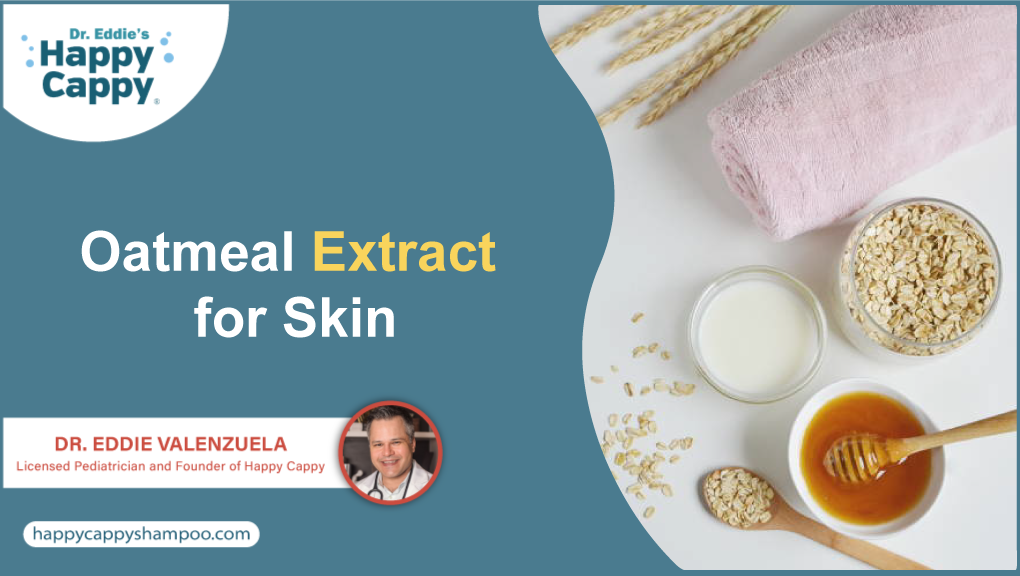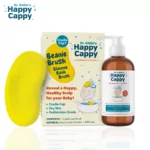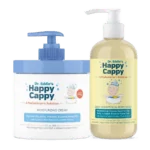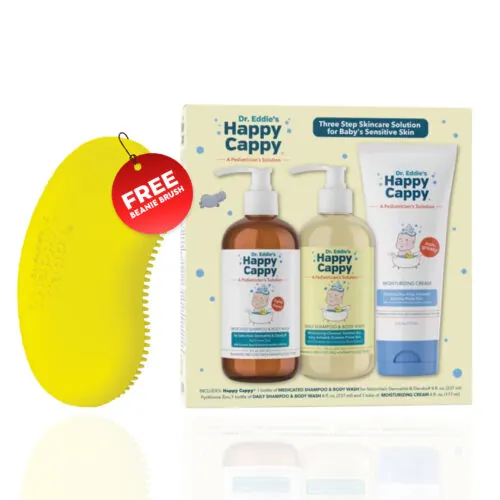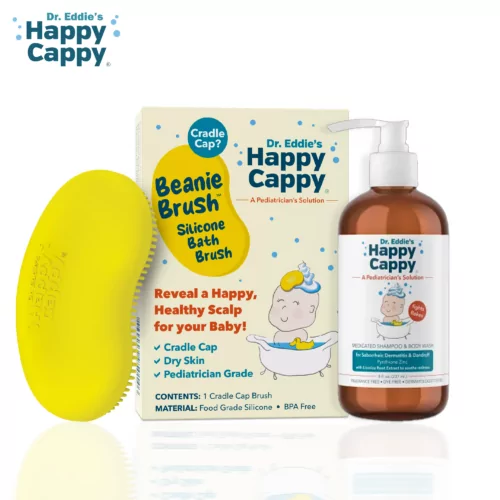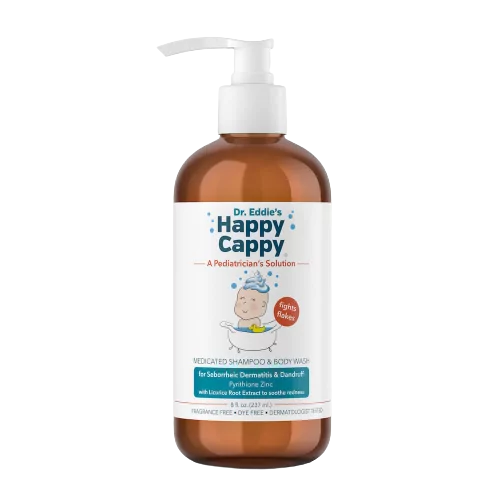Found in the breakfast cereal bowl and one of the ingredients that can be used to make porridge, oats have been used for centuries as a food source.
But did you know that oats also contain skin-soothing qualities that can help soothe itchy, red, and irritated skin? In this blog, we take a closer look at what oatmeal extract is and its benefits for the skin.
What is Oatmeal Extract?
When you think of oatmeal, you may picture the one you have in your kitchen. However, the oatmeal used in skincare products is a little different. It is known as colloidal oatmeal.
The difference between regular oatmeal and colloidal oatmeal is the manufacturing process it has to go through.
Colloidal oatmeal is created through a process in which oat kernels are ground into a fine powder that is dissolved in a liquid emulsion to produce the extract. This process is what makes the magic happen; it unlocks oatmeal’s beneficial properties and makes it a potent ingredient in skincare products.
The two species of oats that can be used for skin preparations in the US are Avena sativa and Avena byzantine. The oatmeal extract used in Happy Cappy Daily Shampoo and Body Wash is Avena Sativa.
Just like our bodies, plants are made up of different components. Plants have lipids, carbohydrates, and enzymes like humans. But they also have a different compound not found in humans called Phenolic Compounds (PCs).
PCs possess numerous bioactive properties, and although they are not nutrients, dietary intake of these may be beneficial [1]. One noteworthy group of Phenolic Compounds found in oats is “Avenanthramides”.
These molecules are believed to provide skin-soothing benefits [2]. Other than phenolic anti-inflammatory agents, oats also contain beta-glucan, which is a natural soothing agent, and Lipids, including omega-3 and omega-6 fatty acids that help nourish and protect the skin.
History of Colloidal Oatmeal
The use of oats for its skin-soothing properties dates back centuries, especially in Egypt, where it was an important ingredient in skincare routines. Oats have also been used as a natural remedy for various skin conditions like eczema, rashes, burns, and erythema.
However, around 1945, the ready-to-use form of colloidal oatmeal was first introduced. It was created by finely grinding oats and boiling them to extract the colloidal material. Thanks to modern technology, the benefits of oatmeal can now be found in various forms, including body wash, bath powders, shampoos, and lotions, making it easier to incorporate it into your daily skincare routine.
The use of colloidal oatmeal as a skin protectant in the USA is regulated by the U.S Food and Drug Administration (FDA) under the Over-The-Counter Final Monograph for Skin Protectant Drug Products issued in June 2003.
Also, its preparation is standardized by the United States Pharmacopia (USP) to ensure its safety and quality.
Key Components of Oat Kernel Extract
Collodial oatmeal is obtained from finely ground whole oat seeds, preserving all of its natural components. Like many plant extracts, oat kernel extract is a rich source of antioxidants. It is approximately composed of 60% polysaccharides, 10-18% proteins, and 5% lipids, along with enzymes, flavonoids, vitamins, and phenolic acids.
Some of the key components of oat extract and their functions are:
- Avenanthramides: These are potent polyphenolic antioxidants and anti-inflammatory agents known for their skin-soothing properties, especially the itching and irritation associated with eczema and sensitive skin.
- Lipids: These are essential fatty acids, such as oleic and linoleic, that help maintain a healthy skin barrier.
- Active Compounds: Oats are rich in flavonoids, minerals, vitamins, compounds, steroidal, and alkaloids, which are important for skin nourishment.
- Proteins: These help hydrate the skin.
- Beta-Glucans: These help retain moisture in the skin, protect it, and can also stimulate collagen production.
- Cellulose and fiber: These contribute to the moisturizing and softening of the skin.
- Saponins: These are naturally occurring compounds in grains that contain gentle cleansing properties that help cleanse irritants and bacteria from the skin’s surface.
Benefits of Oatmeal Extract for Skin
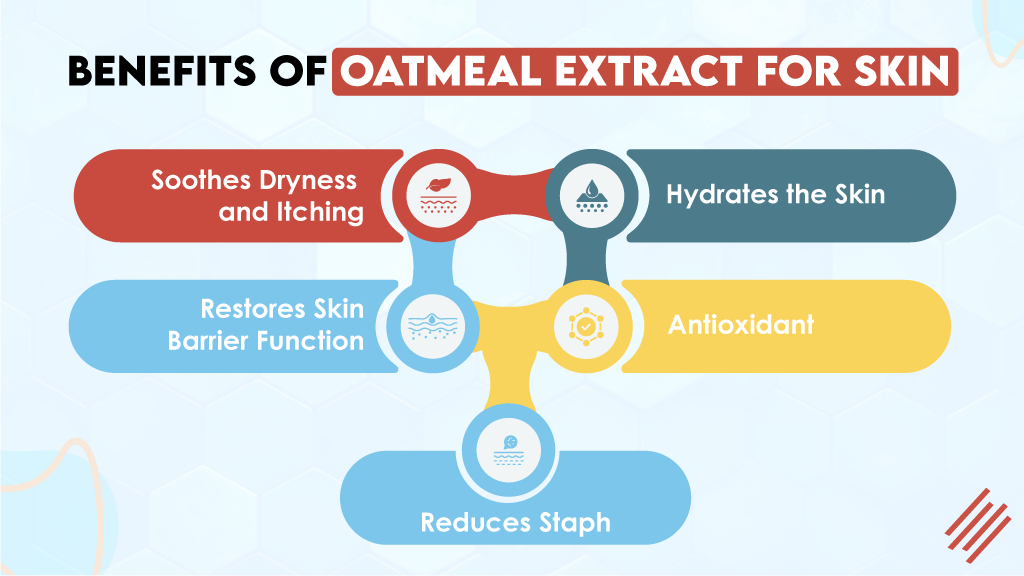
You must have gotten an idea by now that oatmeal can be beneficial for your skin, but here is a little more detail about how beneficial it can be. Some of the most common colloidal oatmeal skin benefits are:
Soothes Dryness and Itching
Oatmeal has been used for centuries to treat various skin conditions as burns, itching, and eczema. However, now the research shows that oatmeal extract contains anti-inflammatory properties that can help soothe itchy, irritated, dry skin [3].
Hydrates the Skin
Oatmeal extract is full of vitamins and minerals that can help moisturize and hydrate your skin and hair as well. Especially for people with dry skin or xeroderma, products containing oatmeal extract can be a great way to reduce the dryness and keep the skin hydrated.
Even the research shows that oat-extract moisturizers can have a great impact on skin hydration and elasticity [4].
Restores Skin Barrier Function
It is believed that oatmeal not only helps moisturize your skin but also protects it from outside irritants and retains the moisture in the skin by strengthening the skin’s natural barrier [5].
Research shows that it can help improve the skin barrier function by boosting the activity of the genes that support skin’s strength, hydration, and pH balance [6].
Antioxidant
Research shows that oatmeal extract contains antioxidant properties that can help protect the skin in different ways. The natural compound known as avenanthramides, found in the oat extract, is believed to be a strong antioxidant [7].
Additionally, oatmeal contains flavanoids that absorb hamrnful UV rays and shield the skin from sun damage [8]. Together these antioxidant and flavonoids make oats a great antioxidant.
Reduces Staph
Colloidal oatmeal can also help soothe the eczema symptoms by lowering the presence of Staphylococcus aureus (staph) on the skin [9]. Staph is naturally present on our skin, however, sometimes it can overgrow and worsen the inflammation in people experiencing eczema.
Colloidal oatmeal contains natural irritation reducing properties that can help reduce staph level, strengthen the skin barrier, and help reduces the chances of an eczema flare-up.
Oat Extract for Skin Conditions
Oatmeal extract has been used for years to help soothe and protect the skin, helping with sunburns, dry skin, and mild rashes. It has also been used for chronic skin conditions like eczema and psoriasis.
Various scientific studies have explored the effectiveness of colloidal oatmeal in managing these skin conditions.
Eczema
Eczema is a chronic inflammatory skin condition that causes red, dry, irritated, itchy skin. While it is more common among children under the age of five, anyone can experience it at any stage of life.
Oatmeal has been used for decades to soothe the itching and irritation associated with eczema, generally it has been used as oatmeal baths. However now there are various skin care products that are infused with colloidal oatmeal and are used to soothe the skin.
Different scientific studies support the effectiveness of oatmeal in managing eczema. One study examined the effects of 1% colloidal oatmeal cream on irritant hand eczema (HE). The study included 79 patients who were divided into two groups, one of them using oatmeal cream and the other one base cream.
The results of the study showed that while both the groups experienced relief in symptoms in the first 2 weeks, the ones using base cream experienced the symptoms returning after the discontinue of use. While those using oatmeal experienced significant improvements throughout the study [10].
Psoriasis
A study published in the Journal of the American Academy of Dermatology examined the effectiveness of 1% colloidal oatmeal on people experiencing psoriasis. 60 women with sensitive skin and psoriasis were asked to apply it once daily all over their body for four weeks.
After a month, the patients experienced significant improvement in various skin parameters such as:
- Dry skin
- Skin peeling
- Roughness
- Smoothness
- Redness
- Discomfort
- Itchy skin
On an average there was about 38% improvement across all the parameters, which shows that oatmeal can help in soothing and improving psoriasis-prone skin [4].
Is Oatmeal Extract Safe?
Collodial oatmeal is generally considered safe to be used on most people and skin types. It rarely causes allergic reactions or skin irritation, this is why it can also be used on sensitive, eczema-prone skin.
In the United States, the FDA has approved colloidal oatmeal as an over-the-counter skin care ingredient. According to the FDA, when formulated at the correct concentration and labeled with “Drug Facts,” products containing collodial oatmeal can help soothe itchy skin caused by dryness, chicken pox, poison ivy/oak/sumac, and insect bites.
However, people with known oat, barley, or wheat allergy should avoid using colloidal oatmeal or consult a doctor before using it. Even though it is rare, in some cases, people suffering from celiac disease may experience skin rashes by topically applying oatmeal extract.
If you experience symptoms such as
- Hives
- Coughing
- Shortness of breath
- Wheezing
- Throat tightness
- Nausea
- Vomiting
- Skin irritation
Discontinue the use of the product containing colloidal oatmeal and consult a healthcare provider.
Happy Cappy and Oatmeal Extract (Avena Sativa)
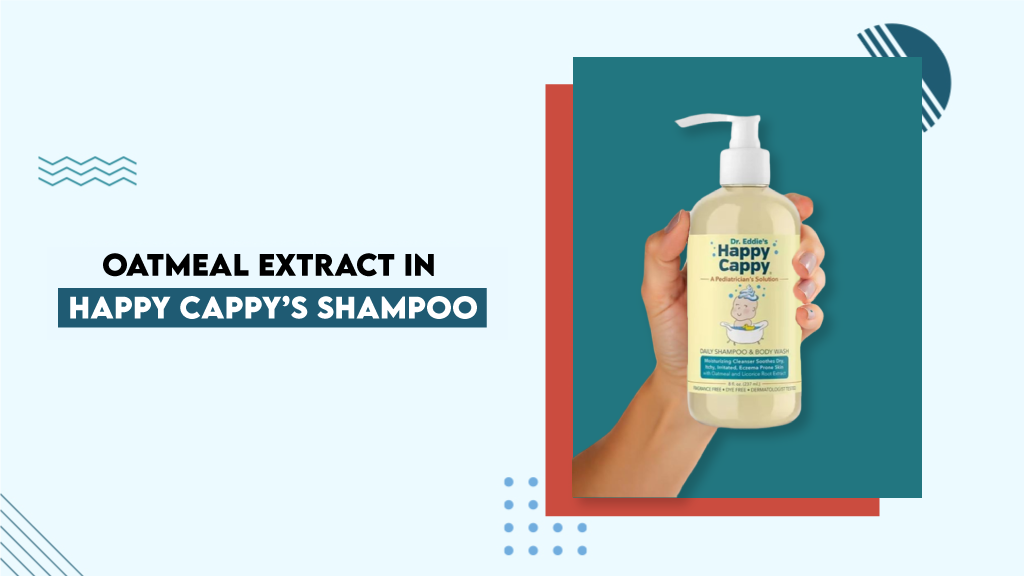
We love this ubiquitous ingredient sourced from plants and admire its long history of soothing skin. We utilize Oatmeal Extract for its ability to draw moisture into the topmost layers of skin as a humectant. Oatmeal extract is just one more effective ingredient chosen to produce a safe baby shampoo for eczema.
Our Happy Cappy Eczema Shampoo and Body Wash contains oatmeal extract to provide you with all of its skin hydrating and soothing benefits, especially for those who have sensitive, dry, irritated, eczema-prone skin.
Conclusion
Oatmeal extract has been used for centuries as a potent skincare ingredient, especially for soothing dry, irritated, sensitive skin. However, now research has shown that oatmeal extract or colloidal oatmeal actually possess various flavonoids and natural compounds such as avenanthramides that have various benefits for the skin.
From hydrating the skin, strengthening its natural barrier, reducing staph on skin, to acting as a skin protectant. This is why it is even approved by the FDA to be used as an active ingredient in skincare products.
Colloidal oatmeal is a safe, gentle, yet effective ingredient for eczema-prone skin of all ages which is why it is used in Happy Cappy Daily Shampoo for Eczema to help you soothe the itching, redness, and irritation on sensitive and eczema prone skin.
References
- [1] de la Rosa, et al. “Phenolic Compounds.” Postharvest Physiology and Biochemistry of Fruits and Vegetables. Published 2019. https://www.sciencedirect.com/topics/food-science/phenolic-compound . Accessed 18 April 2020
- [2] “Safety Assessment of Avena sativa (Oat)-Derived Ingredients as Used in Cosmetics.” Cosmetic Ingredient Review. Final Report. Release Date: January 15, 2015
- [3] Reynertson, K. A., Garay, M., Nebus, J., Chon, S., Kaur, S., Mahmood, K., Kizoulis, M., & Southall, M. D. (2015). Anti-inflammatory activities of colloidal oatmeal (Avena sativa) contribute to the effectiveness of oats in treatment of itch associated with dry, irritated skin. Journal of Drugs in Dermatology: JDD, 14(1), 43–48. https://pubmed.ncbi.nlm.nih.gov/25607907/
- [4] Sarvajnamurthy Aradhya Sacchidanand, Satish Udare, Dhammraj Madhukar Borade, Narayanan, V., Sagar Katare, Mane, A., & Shah, A. (2018). A randomized, assessor-blinded, comparative study to evaluate the efficacy and safety of oat extract-based moisturizer in adult individuals with dry skin. Clinical Dermatology Review, 2(2), 58–58. https://doi.org/10.4103/cdr.cdr_37_17
- [5] Kim, H., Hwang, H.-J., Woo Duck Seo, & Hee, S. (2023). Oat (Avena sativa L.) Sprouts Restore Skin Barrier Function by Modulating the Expression of the Epidermal Differentiation Complex in Models of Skin Irritation. International Journal of Molecular Sciences, 24(24), 17274–17274. https://doi.org/10.3390/ijms242417274
- [6] Ilnytska, O., Kaur, S., Chon, S., Reynertson, K. A., Nebus, J., Garay, M., Mahmood, K., & Southall, M. D. (2016). Colloidal Oatmeal (Avena Sativa) Improves Skin Barrier Through Multi-Therapy Activity. Journal of Drugs in Dermatology: JDD, 15(6), 684–690. https://pubmed.ncbi.nlm.nih.gov/27272074/
- [7] Allais, B., & Friedman, A. (2020). ARTICLE: Colloidal Oatmeal Part I: History, Basic Science, Mechanism of Action, and Clinical Efficacy in the Treatment of Atopic Dermatitis. Journal of Drugs in Dermatology, 19(10).
- [8] Feily, A., Kazerouni, A., Pazyar, N., & Yaghoobi, R. (2012). Oatmeal in dermatology: A brief review. Indian Journal of Dermatology, Venereology, and Leprology, 78(2), 142. https://doi.org/10.4103/0378-6323.93629
- [9] Sobhan, M., Hojati, M., Vafaie, S.-Y., Ahmadimoghaddam, D., Mohammadi, Y., & Mehrpooya, M. (2020b). The Efficacy of Colloidal Oatmeal Cream 1% as Add-on Therapy in the Management of Chronic Irritant Hand Eczema: A Double-Blind Study. Clinical, Cosmetic and Investigational Dermatology, 13, 241–251. https://doi.org/10.2147/CCID.S246021
- [10] Sobhan, M., Hojati, M., Vafaie, S.-Y., Ahmadimoghaddam, D., Mohammadi, Y., & Mehrpooya, M. (2020). The Efficacy of Colloidal Oatmeal Cream 1% as Add-on Therapy in the Management of Chronic Irritant Hand Eczema: A Double-Blind Study. Clinical, Cosmetic and Investigational Dermatology, 13, 241–251. https://doi.org/10.2147/CCID.S246021
- [11] Nollent, V., Nebus, J., & Lisante, T. A. (2020). 18724 Tolerance and subject satisfaction of an over the counter colloidal oatmeal (Avena sativa) lotion in patients with psoriasis and sensitive skin. Journal of the American Academy of Dermatology, 83(6), AB220. https://doi.org/10.1016/j.jaad.2020.06.967
FAQs
Is oatmeal good or bad for eczema?
Oatmeal is believed to be good for eczema. It contains anti-inflammatory, antioxidant, and skin-soothing properties that can help soothe the itchy, irritated, dry skin associated with eczema.
What are the benefits of Avena sativa for the skin?
Avena sativa has various benefits for the skin, it:
Moisturizes the skin
Restores the skin barrier
Soothes itchy, dry skin
Works as a skin protectant
Reduces staph that helps soothe eczema
Retains moisture in the skin.
How do you use oat extract on skin?
Oat extract can be used by making its fine powder and mixing it with water to take a bath or make its paste. However the best way to use it is by using skincare products such as body wash and moisturizers that contain oatmeal extract and are labelled as hypoallergenic and safe to be used on sensitive skin.
What are the side effects of using colloidal oatmeal?
In general colloidal oatmeal is considered as safe to be used on all skin types, however, some people who have oat, wheat, or barley allergy may experience allergic reaction by using products containing oatmeal extract.
If you notice that you are experiencing any reaction, immediately discontinue use and consult a doctor.

